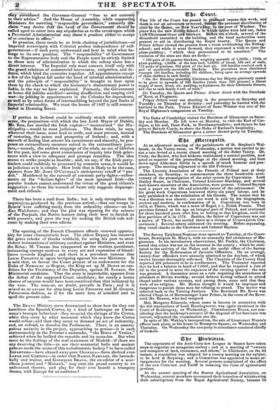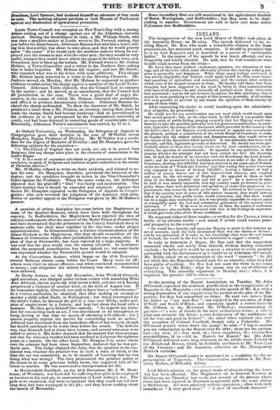Zbe lirobintes.
The opponents of the Anti-Corn-law League in Sussex have taken steps to organize an antagonist society ; and at a meeting of "owners and occupiers of land, tradesmen, and others," in Chichester, on the 3d instant, a requisition was adopted for a county meeting on the subject, to be held at Steyning ; and a Committee was appointed to make ar- rangements for the meeting. Several persons complained of the effect of the new Corn-law and Tariff in reducing the value of agricultural produce.
At the annual meeting of the Boston Agricultural Association, on Wednesday, several members announced their intention of withdrawing their subscriptions from the Royal Agricultural Society, because its President, Lord Spencer, had declared himself an advocate of free trade in corn. The meeting adopted petitions to both Houses of Parliament against any diminution of agricultural protection.
Leeds Town-Council was occupied on New Year's Day with a stormy debate arising out of a charge against one of the Aldermen, recently revived. During the disturbances in 1842, a Mr. William Smith, who was then a machine-maker at Leeds, wrote to Mr. Ferrand, stating, that just before the disturbances, Alderman Bateson had sent him a letter, tell- ing him that a strike was about to take place, and that he would greatly serve "the. cause" if he would turn the machine-makers whom he em- ployed into the streets to mix with the other men ; for they would be very useful, because they would know where the plugs of the boilers were, and, if required, how to blow up the boilers. Mr. Ferrand wrote to Mr. Joshua Hobson, a Town-Councillor and a writer in the Northern Star, asking him to make inquiries. Mr. Hobson did inquire ; and saw Mr. Smith ; who repeated what was in his letter, with some additions. This charge Mr. Hobson lately renewed in a letter to the Morning Chronicle. Mr. Jackson moved, on Monday, that Mr. Hobson be requested to produce evidence to substantiate his charge against a member of the Leeds Town- Council. Alderman Tottie objected, that the Council had no concern in the matter ; and he moved, as an amendment, that the Council had ittirjarisdietion in the case. There was a great deal of angry dis- cussion, in the course of which Mr. Hobson reiterated the accusation, and offered to produce documentary evidence. Alderman Bateson de- clared the charge unfounded. To show the character of Mr. Smith, he produced a letter from a Mr. Preston, an attorney, stating that, since he made the charge, Smith had become bankrupt—had so prevaricated in his evidence as to be pronounced by the Commissioner unworthy of credit, and had been detected in removing goods of considerable value. Eventually, Alderman Tottie's amendment was carried, by 37 to 5.
At Oxford University, on Wednesday, the Delegates of Appeals in Congregation gave their decision in the case of M`Mullen versus Hampden, Regius Professor of Divinity. Mr. M'Mullen was a candi- date for the degree of Bachelor of Divinity ; and Dr. Hampden gave the following subjects for his exercises-
" 1. The Church of England does not teach, nor can it be proved from Scripture, that any change takes place in the elements of consecration in the Lord's. Supper. "2. It is a mode of expression calculated to give erroneous views of Divine revelation, to speak of Scripture and tradition as joint authorities in the matter qf Christian doctrine."
Mr. 3I'Mullen refused to write on these subjects, and claimed to se- lect his own. Dr. Hampden, therefore, prevented the bestowal of the degree; and the candidate brought an action in the Vice-Chancellor's Court against the Professor. When the cause came on, the defendant objected that the plaintiff's " libel" was faulty and inadmissible. The Court decided that it should be amended and admitted. Against that deeree Dr. Hampden appealed to the Delegates of Appeals in Congre- gation ; who now reversed the judgment of the Assessor, with costs. Notice of another appeal to the Delegates was given by Mr. M'Mullen's. Preetor.
A question of prison discipline has come before the Magistrates at some of the Quarter-Sessions, which have been held throughout the country. In Bedfordshire, the Magistrates have rejected the idea of Battery confinement after the manner of the Model. Prison at Pentonville, and have determined that the prisoners in the County Gaol shall sleep in separate cells, but shall meet together in the day-time, under proper superintendence. In Gloucestershire, a distinct recommendation of Sir James Graham to the Magistrates, that they should consolidate all the Houses of Correction within their jurisdiction into one prison, after the plan of that at Pentonville, has been rejected by a large majority. It was said that the plan would cost the county 157,000/. In Leicester- shire, the proposed consolidation has been agreed to ; but some doubt was. expressed whether the Pentonville system would be adopted.
• At the Carmarthen Assizes, which began on the 27th December, several Rebecca rioters came before the Court. Many were let off; others were tried on minor offences, and when convicted recommended to mercy ; and altogether the utmost leniency was shown. Sentences were deferred.
At Derby Assizes, on the 22d December, John Winfield Grocock, aged seventeen, was charged under various counts with assaulting Eliza An Allwood, eleven years old, with intent to kill, and also with having perpetrated a violence of another kind, on the 25th of August last. If We remember rightly, Grocock was said to have been a "schoolmaster." In a written confession, he admitted, that after making an attempt to murder a child called Gadd, at Nottingham ; but being interrupted by the child's tither, he decoyed the girl to a lane near Derby, under pro- mise of employment in a factory, and beat her about the head with a hammer. He then gave himself into custody. " As regards my inten- tion for committing such an act, I was determined to be transported or hung, having at that time no means of obtaining a livelihood ; but I cannot properly explain the motive for committing such an action." Allwood had recovered from the immediate effect of her wounds, though her health continued to be worse than before the attack. The defence was, that Grocock had at times been insane; and several witnesses were called to prove it His father deposed that his manner had been strange, and that the witness's brother had been confined at Leicester for eighteen years as a lunatic. On the other hand, Mr. Douglas Fox, under whose care the prisoner had been since September, declared that he was per- fectly sane. The Judge charged the Jury, that the question to be con- sidered was, whether the prisoner was in such a state of mind, at the time the act was committed, as to be capable of knowing that he was doing what was wrong? The Jury pronounced the prisoner guilty of the intent to do some grievous bodily harm, but acquitted him of the intent to murder. He was sentenced to transportation for life.
At Huddersfield Guildhall, on the 26th December, Mr. J. W. Moor- house, of Wooldale, was fined 201. fur suffering four girls to be employed as harriers in his coal-pit, in contravention of Lord Ashley's Act. The girls were examined, and were so ignorant that they could not tell how long they had been employed in the pit ; and they knew nothing about the month of November,
Some incendiary fires are still mentioned in the agricultural districts of Essex, Nottingham, and Bedfordshire ; but they seem to be dimi- nishing in number. Government are said to have sent some active Policemen into Bedfordshire.































 Previous page
Previous page